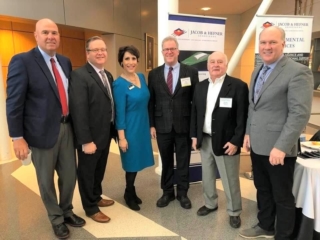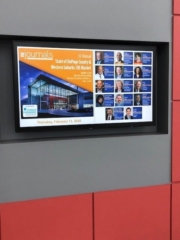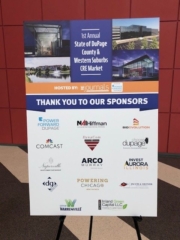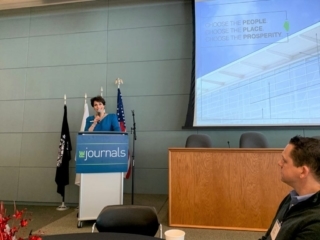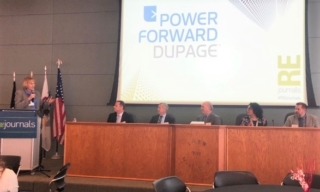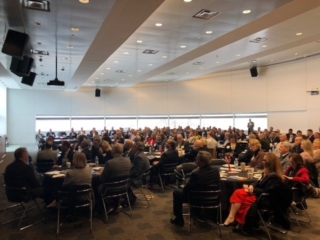Last month, REjournals hosted the first annual State of DuPage County & Western Suburbs CRE Market. Held at the IBEW Local 701 Hall in Warrenville, the sold-out crowd heard from local policy experts and CRE professionals about what makes this part of the Chicago metro stand out.
Karyn Charvat, executive director of PowerForward DuPage, emceed the event and welcomed the introductory speakers to the stage. Dan Cronin, DuPage County Board chairman, delivered opening remarks and Greg Bedalov, president and CEO of Choose DuPage Economic Development Alliance, delivered the keynote address.
Cronin came ready with stats, pointing out that DuPage County—currently enjoying best-in-30-years unemployment rate of 2.2 percent—is home to 90,000 businesses supporting more than 650,000 jobs, more than in the city of Chicago.
“We strive to foster growth in a manner that preserves the characteristics making DuPage County such a wonderful place to raise a family and to do business,” said Cronin.
Christine Jeffries, president of Naperville Development Partnership, moderated the first panel, looking at the state of the county’s office, industrial, retail, multifamily and senior housing sectors. Joining her were Jim Adler, executive vice president, NAI Hiffman; Steve Chirico, Mayor, City of Naperville; Bryan Gay, president and CEO, Invest Aurora; Ron Lunt, partner, Hamilton Partners and Mari Rodriguez, operations manager, DynaCom Management.
The local office market, the panel noted, has been somewhat in flux recently. The East-West corridor, usually one of the steadiest suburban office submarkets, had the largest jump in vacancy last quarter, ending 2019 with a 16 percent vacancy rate.
There are signs of life, however. Adler pointed to Franklin Partners’ redevelopment of The Shuman. The 350,000-square-foot, highly amenitized office building in Naperville, Illinois recently welcomed its first occupants] and is filling up fast with three confirmed tenants.
“It’s fitting that we’re here at the beginning of the next decade because I think we’re going to see version 2.0 of suburban office,” said Adler.
Mayor Chirico talked about a project that was looking to turn a vacant “limited services” hotel into micro apartments. The developers found after acquisition that the repositioning wasn’t financially feasible, but they are going to go ahead with a demolition and ground-up construction of a micro apartment property—showing that the demand is there for both new multifamily units and this niche property type.
As for retail, Gay pointed to the $7 million in capital improvements that Centennial has put into Fox Valley Mall, transforming the entire main area into more of an indoor park. The Dallas-based developer has proposals before the Aurora government to redevelop land on the mall’s out lots, including a 45,000 square foot theater complex.
The second panel looked at DuPage county development, investment, capital markets and data centers. Michael Cassa, president and CEO, Downers Grove Economic Development Corporation, moderated the discussion, which also included Bedalov; Steve Caton, CCIM, CIPS, principal, investment broker, Caton Commercial Real Estate Group; Anna Maria Kowalik, senior vice president, director of business development, The Illinois Energy Conservation Authority NFP; Kevin Kobe, associate, investment properties, CBRE and Sean Reynolds, managing director, JLL.
On the previous panel, Mayor Chirico pointed out that data centers are not the best installations in terms of job creation or tax revenue. However, they are utilities that become more and more essential every year as companies increase their usage of cloud storage. Data centers can also be catalysts for site and community improvements.
“Data center developers and operators pay significant value for pieces of land that have good network and utility infrastructure,” Reynolds said. “On average, the big players like Microsoft or Google or AWS spend $1,000 per square foot. So, if they put up a half-a-million-square-foot building, that’s half a billion dollars.”
Unlike other communities in the MSA—in particular, Chicago itself—tax breaks and other incentives are hard to come by in DuPage County. Bedalov describes the practice as a “race to the bottom.”
“With all due respect to the real estate brokers and developers in the room, if you do an electric or utility tax incentive on a data center, for example, you better be prepared to do it for every data center because as soon as it is out there, the development community is really smart and soon it becomes an expectation,” Bedalov said. “Choose DuPage believes that the best incentive that we can have is a low cost of doing business and a low tax rate.”
There is one new incentive available to developers in DuPage and elsewhere in the state: the commercial Property Assessed Clean Energy (C-PACE) incentive. Last August, the first implementation of the program was in DuPage County, with $318,000 in incentives to fund a roof replacement and solar photovoltaic system on a Wood Dale property.
“What’s unique about this tool is it began as a public-private partnership—the public portion being the enablement of this legislation state by state, and the private portion being the private equity investment in private projects,” Kowalik said. “These projects can be retrofit, they can be new construction and they can get up to 100 percent financing.
In the end, the first annual State of DuPage County & Western Suburbs CRE Market conference was a huge success, as the venue was standing room only. The expert speakers touched on a number of other topics, such as wooing millennials back from the CBD, fiber availability, industrial land prices, TOD development in the suburbs, Cook County assessments and more—proof that there’s plenty going on in DuPage.
Source: REjournals

